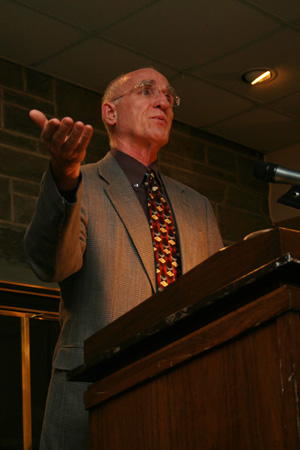Scott Russell Sanders, author and professor at Indiana University, has written 19 books, including seven children’s books and eight works of fiction. Sanders, whose writings have been included in “The Norton Reader” and “The Art of the Personal Essay,” presented a lecture, “Honoring the Ordinary” on Tuesday in the Klingenstein Lounge. Sanders will read from his works today at 7:30 p.m. in the Clark Lounge.

Contributing Writer Cait Logan talked with Sanders about his latest writings and experiences as a teacher and author.
Cait Logan: What is the meaning behind the title of your lecture, “Honoring the Ordinary”?
Scott Russell Sanders: I think that our culture tends to be attracted to the sensational, whether it’s films or television or news reporting, or in fact a lot of literature. Celebrities and sensations occupy most of our cultural media. And I argue that most of us lead unsensational lives … [and] that ordinary lives deserve
our attention.
CL: What inspired you to write your personal memoir, “A Private History of Awe”?
SRS: Several factors. First of all, it’s not the kind of book I ever imagined I would write. I’m weary of memoirs because they can lead to self-indulgence … but I was moved to [write] it by a number of personal and public impulses. On the personal side, my mother was dying, the last of my parents and my wife’s parents. She was dying; she was withering; she was losing her speech, losing her physical capacities and dwindling towards death. And I wanted to think about what it feels like to dwell or to live on the great well of life. … Another personal reason is that I wanted to take stock of my own personal spiritual beliefs after a lifetime of religious reflection, as I said, to take stock of what I most deeply believe about the nature of things and of human existence. … On the public side, I was moved to write [my memoir] by my dismay over the way in which our society under the current administration in Washington made an exclusively military response to the 9/11 tragedies. Instead of using those violent acts as an occasion to learn about ourselves and about our country, and our way of life, it was used as an excuse for warfare.
CL: In your writing, you speak a lot about childhood and memories from earlier life. What impact do you feel our childhood has on our lives?
SRS: Well everything of course depends on the nature of our childhood. Our parents tend to have the deepest impact on us as children — that’s pretty natural. And if we had the good fortune to have parents that loved us and introduced us to good values, and gave us good experiences, then we are very fortunate. And I feel that I had such a childhood. I feel very fortunate in the way I was reared. We didn’t have a lot of money — we didn’t live in fancy houses. We lived a pretty economically modest life, but it was a life rich in love and rich in care and rich in experiences of the natural world. … If people are neglected by their parents, if their parents are more interested in making money then they are in raising children, if the parents try to substitute buying things for providing meaningful experience, then people can grow up being impoverished by their childhood. They can be impoverished even if they’ve had a lot of money. They can be impoverished simply because they haven’t had good values modeled for them by their parents or they haven’t had a richness of experience opposed to a richness of possessions.
CL: What do you hope to accomplish through your writing?
SRS: The first thing I hope to accomplish through my writing is a deeper understanding of my own personal experience and a deeper understanding of what it means to be human. I don’t take myself as a model of “being human.” I’m just the one I know the most about. In my writing, I also write about the other people I know — family members, friends, people I meet — and I’m always thinking about [these] question[s]: What does it mean to be human? What are our lives about? What’s worth doing in our lives? What matters most? So I’m asking those questions simply because I want to have a clearer sense of the answers. The second thing I’m going to do through my writing is to share whatever understanding I have achieved with readers.
CL: As a professor, what kind of impact do you hope to have on students?
SRS: I hope through my teaching to open doors for students, to put them in touch with books, with writers [and] with ideas that will awaken them to new possibilities in their own lives and in the world. … I hope to encourage them to lead more thoughtful lives — lives that are more concerned with understanding than with the pursuit of money or the pursuit of things.







